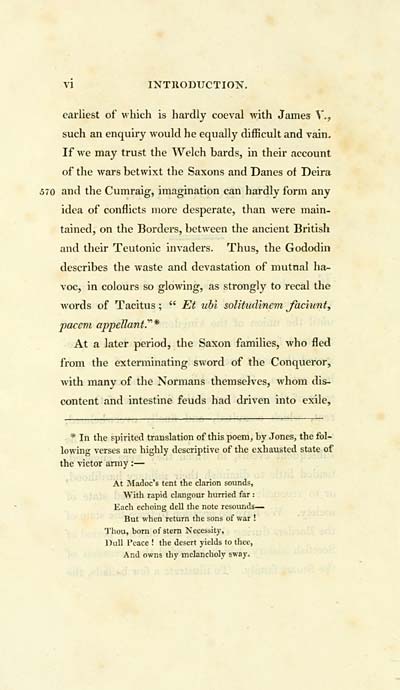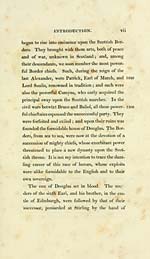Download files
Complete book:
Individual page:
Thumbnail gallery: Grid view | List view

VI INTRODUCTION.
earliest of which is hardly coeval Avith James V.,
such an enquiry would he equally difficult and vain.
If we may trust the Welch bards, in their account
of the wars betwixt the Saxons and Danes of Deira
570 and the Cumraig, imagination can hardly ibrm any
idea of conflicts more desperate, than were main-
tained, on the Borders, between the ancient British
and their Teutonic invaders. Thus, the Gododin
describes the waste and devastation of mutual ha-
voc, in colours so glowing, as strongly to recal the
words of Tacitus ; " Et uhi solitudmem Juciunty
pacem appellant.'"*'
At a later period, the Saxon families, who fled
from the exterminating sword of the Conqueror,
with many of the Normans themselves, whom dis-
content and intestine feuds had driven into exile.
* In the spirited translation of this poem, by Jones, the fol-
lowing verses are highly descriptive of the exhausted state of
the victor array : —
At Madoc's tent the clarion sounds.
With rapid clangour hurried far :
Each echoing dell the note resotinds —
But when return the sons of war !
Thou, born of stern Necessity,
Dull Peace ! the desert yields to thee,
And owns thy melancholy sway.
earliest of which is hardly coeval Avith James V.,
such an enquiry would he equally difficult and vain.
If we may trust the Welch bards, in their account
of the wars betwixt the Saxons and Danes of Deira
570 and the Cumraig, imagination can hardly ibrm any
idea of conflicts more desperate, than were main-
tained, on the Borders, between the ancient British
and their Teutonic invaders. Thus, the Gododin
describes the waste and devastation of mutual ha-
voc, in colours so glowing, as strongly to recal the
words of Tacitus ; " Et uhi solitudmem Juciunty
pacem appellant.'"*'
At a later period, the Saxon families, who fled
from the exterminating sword of the Conqueror,
with many of the Normans themselves, whom dis-
content and intestine feuds had driven into exile.
* In the spirited translation of this poem, by Jones, the fol-
lowing verses are highly descriptive of the exhausted state of
the victor array : —
At Madoc's tent the clarion sounds.
With rapid clangour hurried far :
Each echoing dell the note resotinds —
But when return the sons of war !
Thou, born of stern Necessity,
Dull Peace ! the desert yields to thee,
And owns thy melancholy sway.
Set display mode to: Large image | Transcription
Images and transcriptions on this page, including medium image downloads, may be used under the Creative Commons Attribution 4.0 International Licence unless otherwise stated. ![]()
| Early Gaelic Book Collections > J. F. Campbell Collection > Minstrelsy of the Scottish border > Volume 1 > (18) |
|---|
| Permanent URL | https://digital.nls.uk/80608542 |
|---|
| Description | Vol. I . |
|---|---|
| Shelfmark | Cam.2.d.17 |
| Additional NLS resources: | |
| Attribution and copyright: |
|
| Description | Volumes from a collection of 610 books rich in Highland folklore, Ossianic literature and other Celtic subjects. Many of the books annotated by John Francis Campbell of Islay, who assembled the collection. |
|---|
| Description | Selected items from five 'Special and Named Printed Collections'. Includes books in Gaelic and other Celtic languages, works about the Gaels, their languages, literature, culture and history. |
|---|

